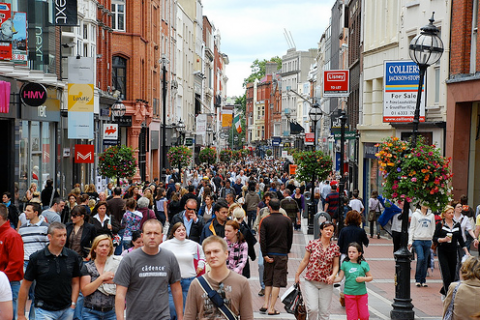FG/Labour offer potential for positive change in immigration legislation

When the 30th Dáil was dissolved, the previous Government's third attempt at legislation overhauling Ireland's immigration and asylum systems lapsed, a development widely welcomed by the NGO sector, writes Ruth Evans of the Immigrant Council of Ireland (ICI).
Despite being 10 years in the making, the legislation failed to spell out who can come to Ireland, for how long or with what rights and obligations.
What it did contain, according to the Opposition spokespeople who were combing through the Immigration, Residence and Protection Bill at committee stage, were provisions which would copper-fasten an "undesirable ethos" in the immigration system and inherent racial prejudice.
These are very serious charges indeed.
With these opposition parties now likely to be responsible for re-writing the legislation, the NGOs in the immigration sector will be closely watching to see that a future Bill is fair and transparent and provides migrants and their family members with access to justice.
There is some reason to be optimistic.
Fine Gael and Labour commit in their manifestos to introducing comprehensive immigration reform, with access to an independent appeals mechanism for immigration-related decisions. This is something the Immigrant Council of Ireland has been seeking for some time. Labour goes a step further than Fine Gael by promising to enact new legislation within 12 months.
Sinn Féin also promises an independent appeals tribunal for immigration-related decisions while Fianna Fáil and the Greens make no mention of these issues at all.
The Labour Party also commits to speeding up the administrative processes relating to immigration decisions. This is particularly welcome as migrants can now be left waiting years, literally, for decisions on issues as fundamental as whether or not they can continue to legally live in Ireland or have family members join them here.
Sinn Féin promises to end "reverse discrimination" applying to Irish citizens with non-EU citizen family members. While EU citizens living and working in Ireland have the right to be joined by non-EU citizen family members here, Irish citizens do not. The party says it would legislate for family reunification rights for Irish citizens equal to those of other EU citizens.
Comparing the parties' election manifestos in relation to immigration and integration is not comparing like with like.
One thing all of the parties are silent on, however, is the need to overhaul Ireland's shamefully dysfunctional process for awarding citizenship by naturalisation.
Of the 27 EU Member States, Ireland has the second lowest rate of naturalisation of migrants – six per 1,000 resident foreign nationals.
Ireland also rejects a far higher proportion of the applications for naturalisation it receives than other countries. The Government rejects migrants' applications for comparatively very trivial reasons, for example, minor traffic offences that have not resulted in a conviction or fine.
As only Irish and British citizens are allowed to vote on Friday, this Government policy is excluding many migrants from having any say on the future of the country they now call home.
It also risks creating a permanently excluded group of marginalised people who, although affected by government decisions and policies, have no opportunity to elect those responsible for those decisions and policies – or to hold them to account.
The Green Party says it will introduce a citizenship test, along with a "learning programme" on Irish culture and history for people applying for citizenship.
A very brief overview of the parties' other commitments:
- International students: Fine Gael and Labour promise to overhaul the student visa system. Fine Gael promises to double the number of students while Labour foreshadows clearer rights and better information.
- Tourists: Fine Gael, Labour and Fianna Fáil commit to improved tourist visa processes. Fine Gael would explore the possibility of a single tourist visa covering non-EU citizens' visits to both the UK and Ireland.
- Integration: The Greens and Sinn Féin commit to combating racism and discrimination, while Labour promises to promoting equality and inclusion. Sinn Féin promises stronger hate crime legislation, reinstating funding to Ireland's gutted equality infrastructure and a new Oireachtas Committee on Equality and Human Rights. Sinn Féin would extend voting rights to migrants who have been legally resident in Ireland for at least five years.
- Vulnerable migrants: Labour has committed to abolishing the Habitual Residence rule, which applies to people applying for social welfare, in the case of primary carers. This will help migrant women experiencing domestic violence.
- Combating human trafficking: the Green Party is the only party to commit in its manifesto to tackling sexual exploitation by adopting Sweden's legislative approach, which criminalises the purchase of sex. However, other parties have made this commitment previously. The Greens commit to a range of reforms to improve responses to victims of trafficking.
- Education: the Green Party promises to protect funding for English language teachers and to ensure migrants with established immigration histories in Ireland are not effectively excluded from third-level education by having to pay international student fees. Sinn Féin says it will restore language support teachers where they are needed.
- Other: Labour makes a commitment to tackle financial exclusion through measures including the introduction of basic bank accounts. This will benefit migrants currently paying exorbitant fees to make remittances to families overseas. However, Labour also says it will raise at EU level the issue of the payment of Child Benefit to non-resident children and seek to have the entitlement modified to reflect the cost of living where the child is resident. Fianna Fáil would have Enterprise Ireland launch a campaign to attract overseas entrepreneurs to locate in Ireland.
For more information on the ICI's campaign for immigration reform see here.
